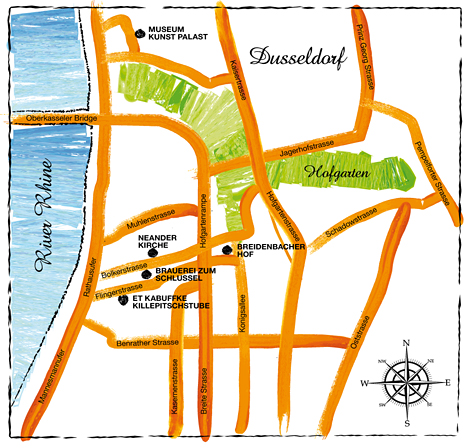Jenny Southan discovers a city with cosmopolitan flare, a quirky drinking culture and plenty to amuse art lovers.

KONIGSALLEE
The modestly sized capital of the North Rhine-Westphalia region in west Germany – and host city to the Eurovision Song Contest 2011, taking place this month for any aficionados out there – is ideal for exploring on foot, and the chestnut tree-lined boulevard of Konigsallee (King’s Avenue) is a good place to start.
Dusseldorf may only have a population of about 580,000 but it’s a big hitter when it comes to business and fashion, holding numerous major trade fairs throughout the year and boasting most of the top designers – from Prada, Chanel and Gucci to Louis Vuitton, Bulgari and Tod’s – along this kilometre-long street. It’s a good spot for splurging on a treat for a loved one but if you don’t want to do damage to your credit card, a meander by the adjacent canal is just as enjoyable – and free. Visit koenigsallee-duesseldorf.de
BREIDENBACHER HOF
At number 11 Konigsallee is the Breidenbacher Hof, a member of Capella Hotels and in situ since 1812, making it one of the oldest hotels in Germany.
If you are interested in extending your business trip to factor in some facial contouring or teeth whitening (see “Executive nip tuck”, businesstraveller.com/archive/2011/april-2011), the Breidenbacher has a private underground clinic for guests to gain access to some of the world’s best plastic surgeons, and luxurious bedrooms in which to recover in privacy.
But if a quick cup of coffee, or a cigar and something stronger, sounds more appealing, pop into the Capella bar on the first floor (open daily from 3pm until late). As well as zebra skin armchairs and a glowing black and gold marble ceiling, the grandiose establishment features a smoking lounge with 124 types of Cuban and Dominican cigars, an excellent selection of single malts and an avant garde cocktail menu. Afternoon tea (€28) is served daily 2pm-5.30pm in the lobby lounge. Tel +49 211 160 900; visit capellahotels.com/dusseldorf
NEANDER KIRCHE
Next stop is the Neander Kirche on Bolkerstrasse in the cobblestone streets of the Altstadt (old town), which was restored after the Second World War.
Dating back to the 1680s, this little baroque church was lucky to survive both world wars and is one of the few Protestant places of worship to exist in this predominantly Catholic city. Set a little way back from the main drag, it is named after Calvinist theologian and hymn writer Joachim Neander, who managed to pen more than 60 songs of praise before his untimely death from tuberculosis in 1680 at the age of 30.
Step inside the simple white interior and you will see a huge pipe organ that was put in place in the mid-1960s. In the summer months, evening organ concerts for up to 500 people take place here. Visit neanderkirche.de
BRAUEREI ZUM SCHLUSSEL
At number 41-47 Bolkerstrasse is a fine example of one of the city’s many traditional drinking institutions, and is well worth a look even if you don’t have time to stay.
Zum Schlussel, which means “the keys”, has been brewing its own Altbier (old beer) since 1850 and you can still see the giant copper vats used for the process out the back. A brewery tour can be arranged (€8, including two beers – call +49 (0)2118 2895 520 to reserve a space).
The open-plan interior has a network of rooms with rustic wooden tables and hardworking waiters who zoom around with dozens of glasses balanced precariously on trays. If you’re hungry, order yourself some blood pudding with onions and rye bread (€4.30) or fried sausage with curry sauce (€4.90), for a taste of authentic local cuisine. Visit zumschluessel.de
ET KABUFFKE KILLEPITSCHSTUBE
Other than champagne, the only alcoholic beverage that can be consumed at any time of day is Killepitsch liquor, or at least that is what the locals think – make your way down to Flingerstrasse 1, a couple of minutes’ away, and you will see what I mean. Served by the shot through the window of the tiny Et Kabuffke bar, the potent plum-red drink is made from more than 90 different herbs and fruits and continues to be distilled in Dusseldorf since its inception in the 1950s. If you want to take a bottle of the stuff home instead of knocking one back on the street, the shop next door to the bar sells them in a range of sizes. Visit killepitsch.de
MUSEUM KUNST PALAST
Your last stop is 2km away so if you are feeling a bit unsteady after all that beer and liquor, call the Taximann (see panel, left) for a ride.
Located at Ehrenhof 4-5, near the River Rhine, the Museum Kunst Palast is set to reopen the galleries that house its permanent collections of textiles, sculpture, graphics and paintings from the likes of Rubens and Cranach on May 7, after a two-year renovation. The Hentrich exhibition of glass is probably the highlight, though, being one of the largest of its kind in Europe.
The museum also hosts regular contemporary art shows – if you are in town before August 7, look out for the Johann Thorn Prikker retrospective of more than 130 art nouveau and abstract pieces in a range of media, from watercolour to mosaic. Open Tues-Sun 11am-6pm, Thurs until 9pm; entry is €9; visit museum-kunst-palast.de
TAXIMANN
If you need a ride, call Juergen – aka Taximann – on +49 700 TAXIMANN (8294 6266). Not only is he a charming character but he may let you pick a CD to play from his collection, and suggest bars and eateries. He even uploads photos of his favourite passengers to his blog (visit taximann-juergen.blogspot.com).
Go to duesseldorf-tourismus.de for more information on the city.








